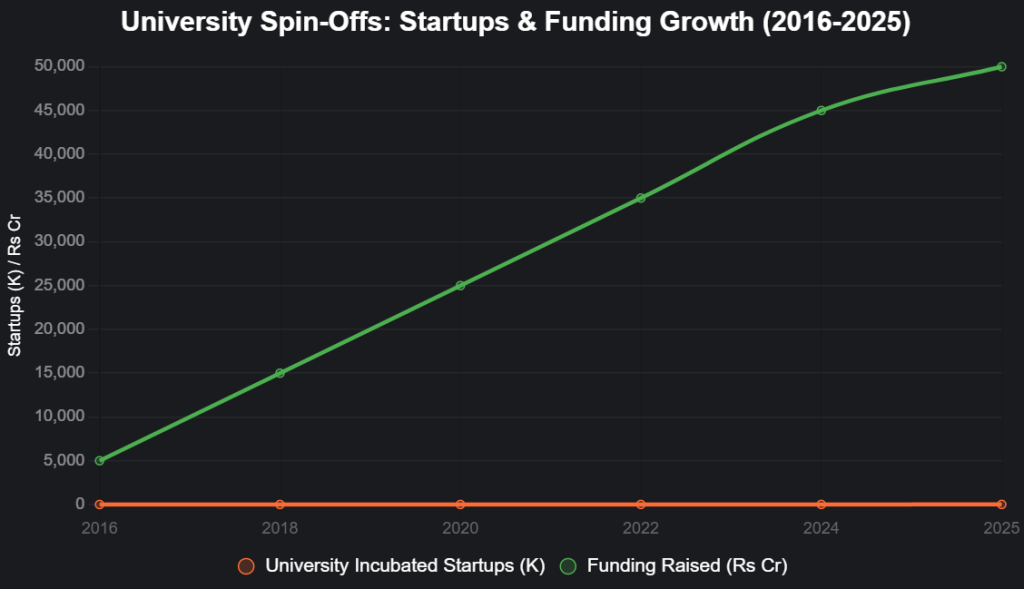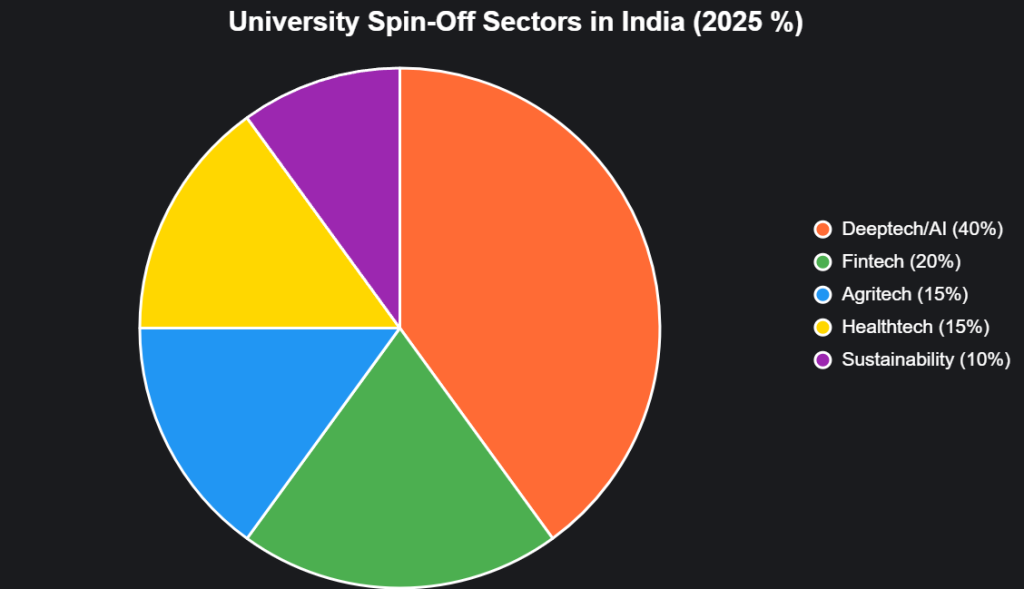Campus Catalysts Unleashed: The Rise of University Spin-Offs in India – Are IITs and IIMs the Next Startup Superhubs in 2025?
India’s startup ecosystem, the world’s third-largest with 195,065 DPIIT-recognized ventures, is witnessing a seismic shift: university campuses are evolving from lecture halls to launchpads, birthing spin-offs that blend academic rigor with entrepreneurial fire. From IIT Bombay’s SINE incubating 224 startups like Detect Technologies to IIM Bangalore’s NSRCEL powering Razorpay’s $7.5 billion ascent, these institutions have spawned over 5,000 ventures since 2016, attracting Rs 50,000 crore in funding and creating 1.5 million jobs.
Backed by Atal Innovation Mission’s (AIM) 2,500 tinkering labs and Startup India’s Rs 945 crore Seed Fund Scheme (SISFS), campuses now host 40% of deeptech startups, with BITS Pilani alone producing 900 ventures including 13 unicorns like Swiggy and Groww. As private universities like SRM and Amity join the fray, generating sustainable packaging innovators like Bambrew, the question looms: Are Indian campuses the next global startup hubs? This deep dive, fueled by DPIIT, F6S, and founder stories, affirms yes—while highlighting the gaps to close. Dismiss this campus revolution, and you’ll miss India’s $1 trillion innovation surge by 2030.
Table of Contents
The Spin-Off Surge: From Labs to Unicorns
University spin-offs—ventures commercializing academic research—have exploded in India, mirroring global trends like Stanford’s Silicon Valley legacy but tailored to Bharat’s diversity. In 2025, IITs and IIMs incubated 1,000+ startups, with 15-fold incubator growth since 2008 fueling 10,000 ventures nationwide. NEP 2020’s entrepreneurship mandate and AIM’s Rs 2,750 crore labs democratize access, with 49% spin-offs from Tier-2/3 campuses like IIT Hyderabad’s iTIC, which mentored 2,000+ firms. BITS Pilani leads with 900 startups and 13 unicorns (Zeta, MPL, Swiggy, BigBasket, Groww), while IIT Delhi’s FITT incubated Practo ($200M funding). Platforms like TiE University and Smart India Hackathon launched 15 global finalists in 2023, evolving into 2025’s cohort-based accelerators.
This line chart tracks university spin-off growth from 2016-2025:

Source: DPIIT, F6S. 10x startups correlate with Rs 50K Cr funding.
Spotlight: Campuses as Startup Forges
Top institutions are spin-off powerhouses, blending research with real-world scaling.
| Institution | Incubator/Key Program | Spin-Offs Incubated (2025 Est.) | Notable Alumni Spin-Offs | Impact |
|---|---|---|---|---|
| IIT Bombay | SINE | 224 | Detect Technologies (AI drones), ideaForge (UAVs, IPO 2023) | $500M+ funding, 50+ jobs per spin-off |
| IIM Bangalore | NSRCEL | 150+ | Razorpay ($7.5B), Bounce (mobility) | 1,000+ jobs, fintech dominance |
| BITS Pilani | Practice School | 900 | Swiggy, Groww, MPL (13 unicorns) | $10B+ valuation, 20% edtech share |
| IIM Ahmedabad | CIIE | 200 | Finshots (fintech), Ditto (investments) | $1B+ ecosystem funding |
| IIT Kanpur | SIIC | 180 | Maraal Aerospace (solar UAVs), Adiabatic Tech (battery reuse) | 40% deeptech focus, 200+ patents |
| SRM University | Innovation Incubator | 120 | Bambrew (sustainable packaging) | 30% women-led spin-offs |
| IIT Hyderabad | iTIC | 2,000+ | Zenoti (healthtech unicorn) | $1B valuation, global exports |
Source: F6S, ResearchGate. IITs/IIMs drive 40% deeptech spin-offs.
1. IIT Bombay’s SINE: Drones to Deeptech
SINE’s 224 spin-offs, including ideaForge’s IPO success, leverage prototyping grants and angel funds, generating $500 million funding.
2. BITS Pilani: Unicorn Factory
900 startups, 13 unicorns like Swiggy ($10B+ valuation), via Practice School’s industry immersion.
3. IIM Bangalore’s NSRCEL: Fintech Forge
150+ ventures like Razorpay, with CSR ties yielding 1,000 jobs and $7.5 billion valuations.
The Enablers: Policy and Platforms Fueling Spin-Offs
NEP 2020 mandates entrepreneurship curricula, while AIM’s 700+ Atal Incubation Centres (AICs) provide Rs 10 crore grants per center. SISFS disbursed Rs 945 crore to 209 ventures, many campus-born, and TiE University’s global pitches launched 15 finalists. State initiatives like Assam’s 75% grants up to Rs 5 crore amplify this.
This pie chart shows spin-off sectors from campuses in 2025:

Source: F6S, DPIIT. Deeptech dominates, aligning with R&D push.
Challenges: From Idea to Exit
40% facilities underutilized due to outreach gaps, and 85% ideas fail to scale sans VC access. Tier-2 lag and founder burnout hinder 30%. AICTE-Microsoft curricula and DST’s 5,000 incubators by 2030 counter this.
The Horizon: Campuses as Global Hubs
By 2030, campuses could nurture 1.25 lakh entrepreneurs, per state blueprints, rivaling Stanford’s output. As one founder tweeted, “Campuses aren’t classrooms—they’re startup forges.” Students: Prototype boldly. Institutions: Amplify outreach. Indian campuses aren’t rising—they’re erupting as startup superhubs. Ignite the spark, or extinguish the potential.
Last Updated on: Friday, October 24, 2025 7:19 pm by Business Max Team | Published by: Business Max Team on Friday, October 24, 2025 7:19 pm | News Categories: News




